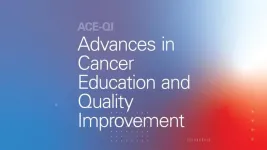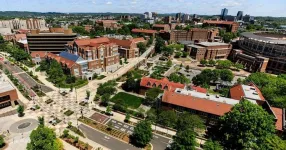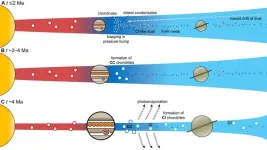(Press-News.org) The University of Texas MD Anderson Cancer Center today announced its first-ever academic journal, Advances in Cancer Education & Quality Improvement (ACE-QI). The journal will publish research, training program summaries and quality improvement interventions for the oncology provider community.
The open-access, peer-reviewed journal will feature research and professional perspectives focused on training health care providers to meet myriad challenges around prevention, diagnosis, treatment and survivorship in cancer care.
“We envision this journal as a catalyst for critical conversations across the cancer care continuum," said Joshua Kuban, M.D., associate vice president of Education & Alumni Relations. "By fostering collaboration and sharing insights, we aim to bridge gaps in education and clinical practice, ultimately leading to improved patient outcomes and enhanced quality of care for cancer patients worldwide. We’re excited to see how this resource will inspire and connect professionals across disciplines.”
Created by MD Anderson’s Division of Education & Training to showcase and share broad research and expert findings across the cancer care and treatment spectrum, the journal represents a collaborative goal. The aim is to create a comprehensive academic source for students, faculty, clinicians and professionals working in cancer education to share and elevate research or initiatives that will improve care outcomes and the patient experience.
“As leaders in cancer education, it’s our responsibility to facilitate growth and expansion of understanding in this area,” said Carin Hagberg, M.D., senior vice president and chief academic officer. “This collective space will allow us to do so with experts from all corners of the oncology field, within our institution and beyond, to ultimately benefit cancer patients and move forward in our goal to end cancer.”
Article submissions are open to anyone working in the areas of quality improvement, education, patient experience and safety in oncology. The editorial board includes 16 members from multiple cancer and academic institutions. The journal’s first issue is planned to be published in spring 2025, with a goal to publish two issues annually, in the spring and fall.
The journal currently is accepting article submissions on:
Creating and adapting training programs
Delivering team-based education
Assessing quality improvement initiatives
Cultivating practices that support high reliability organizations and patient safety
Improving the patient experience
Meeting accreditation standards
Adapting learner-centered education programs to new technologies
In addition to Kuban, editorial staff include Deputy Editor-in-Chief Shalin Shah, M.D., professor of Radiation Oncology, Editorial Director Clara Fowler, director of the MD Anderson Research Medical Library, and Kathryn Krause, library information analyst.
For more information or to submit to the journal, visit: OpenWorks.MDAnderson.org/ACEQI.
END
MD Anderson launches first-ever academic journal: Advances in Cancer Education & Quality Improvement
Open-access journal to feature research and professional findings across the cancer care spectrum to educate the oncology workforce and improve care outcomes
2024-09-27
ELSE PRESS RELEASES FROM THIS DATE:
Penn Medicine at the 2024 ASTRO Annual Meeting
2024-09-27
PHILADELPHIA – Leading experts in radiation therapy from Penn Medicine’s Abramson Cancer Center and the Perelman School of Medicine will present new results from clinical trials and research studies at the American Society for Radiation Oncology's (ASTRO) 66th Annual Meeting, which will be held at the Walter E. Washington Convention Center in Washington, D.C., Sept. 29 through Oct. 2, 2024.
At the meeting, Neha Vapiwala, MD, FACR, FASTRO, FASCO, the Eli Glatstein Professor in Radiation Oncology, will take office as president-elect of ASTRO as the first Penn faculty member to lead the premier society ...
Head and neck, meningioma research highlights of University of Cincinnati ASTRO abstracts
2024-09-27
University of Cincinnati Cancer Center experts will present research at the American Society for Radiation Oncology (ASTRO) Annual Meeting Sept. 29 through Oct. 2.
Osteoradionecrosis more common in patients with head and neck cancer that requires partial jaw removal
Following radiation treatment for head and neck cancer, some patients can experience osteoradionecrosis (ORN) when an area of exposed bone fails to heal after a three-month period.
“ORN of the mandible and maxilla (jaw bones) can be very debilitating, as it often causes severe pain, fistula formation, infection and susceptibility to fractures,” ...
Center for BrainHealth receives $2 million match gift from Adm. William McRaven (ret.), recipient of Courage & Civility Award
2024-09-27
Center for BrainHealth® at The University of Texas at Dallas has received a major match gift commitment from retired U.S. Navy four-star admiral and former University of Texas System chancellor William McRaven and his wife Georgeann. Adm. McRaven recently received the 2024 Bezos Courage & Civility Award presented by Amazon founder Jeff Bezos and Lauren Sánchez.
The $2 million challenge grant will support Optimal BrainHealth for Warfighters – including active-duty military, spouses and veterans. This program will help those with traumatic brain injury (TBI), post-traumatic stress (PTS) and similar issues, as well ...
Circadian disruption, gut microbiome changes linked to colorectal cancer progression
2024-09-27
Irvine, Calif., Sept. 27, 2024 — Research from the University of California, Irvine has revealed how disruption of the circadian clock, the body’s internal, 24-hour biological pacemaker, may accelerate the progression of colorectal cancer by affecting the gut microbiome and intestinal barrier function. This discovery offers new avenues for prevention and treatment strategies.
The study, published online today in the journal Science Advances, offers a more comprehensive understanding of how important changes occur in the function and composition of the gut microbiome when the circadian clock is disturbed in the presence ...
Grant helps UT develop support tool for extreme weather events
2024-09-27
The University of Tennessee and the UT Institute of Agriculture have received a $434,038 Seeding Solutions grant from the Foundation for Food & Agriculture Research (FFAR) to develop and test a decision support tool for farmers to better manage crop production from risks of extreme weather events across the Tennessee River Basin and surrounding southeast US regions.
UT is providing matching funds for a total investment of $966,119 over the three-year project.
The U.S. Department of Agriculture estimates that extreme weather is responsible for 90% of crop losses. These estimates are generally based on annual climate conditions. ...
Autonomous vehicles can be imperfect — As long as they’re resilient
2024-09-27
Researchers from three of Virginia’s premier universities, including the University of Virginia’s Homa Alemzadeh, aim to take the risk out of self-driving vehicles by overcoming inevitable computer failures with good engineering.
The trio will share a $926,737 National Science Foundation award to identify when and where autonomous vehicle systems are most vulnerable to safety-critical failures. They plan to use this knowledge to design ways to efficiently mitigate potential safety hazards and enhance the overall system resilience.
Alemzadeh, an associate professor of electrical and computer engineering in UVA’s School of Engineering and Applied ...
Asteroid Ceres is a former ocean world that slowly formed into a giant, murky icy orb
2024-09-27
Since the first sighting of the first-discovered and largest asteroid in our solar system was made in 1801 by Giuseppe Piazzi, astronomers and planetary scientists have pondered the make-up of this asteroid/dwarf planet. Its heavily battered and dimpled surface is covered in impact craters. Scientists have long argued that visible craters on the surface meant that Ceres could not be very icy.
Researchers at Purdue University and the NASA's Jet Propulsion Lab (JPL) now believe Ceres is a very icy ...
McMaster researchers discover what hinders DNA repair in patients with Huntington’s Disease
2024-09-27
Researchers with McMaster University have discovered that the protein mutated in patients with Huntington’s Disease doesn't repair DNA as intended, impacting the ability of brain cells to heal themselves.
The research, published in PNAS on Sept. 27, 2024, found that the huntingtin protein helps create special molecules that are important for fixing DNA damage. These molecules, known as Poly [ADP-ribose] (PAR), gather around damaged DNA and, like a net, pull in all the factors needed for the repair process.
In people with Huntington’s Disease, however, the research found that the mutated version of this protein doesn’t function properly ...
Estrogens play a hidden role in cancers, inhibiting a key immune cell
2024-09-27
DURHAM, N.C. – Estrogens are known to drive tumor growth in breast cancer cells that carry its receptors, but a new study by Duke Cancer Institute researchers unexpectedly finds that estrogens play a role in fueling the growth of breast cancers without the receptors, as well as numerous other cancers.
Appearing Sept. 27 in the journal Science Advances, the researchers describe how estrogens not only decrease the ability of the immune system to attack tumors, but also reduce the effectiveness of immunotherapies that are used to treat many cancers, notably triple-negative breast cancers. Triple-negative ...
A new birthplace for asteroid Ryugu
2024-09-27
In December 2020 the space probe Hayabusa 2 brought samples of asteroid Ryugu back to Earth. Since then, the few grams of material have been through quite a lot. After initial examinations in Japan, some of the tiny, jet-black grains traveled to research facilities around the world. There they were measured, weighed, chemically analyzed and exposed to infrared, X-ray and synchroton radiation, among other things. At the MPS, researchers examine the ratios of certain metal isotopes in the samples, as in the current study. Scientists refer to isotopes as variants of the same element that differ only in the number of neutrons in the nucleus. Investigations ...
LAST 30 PRESS RELEASES:
GLP-1 drugs associated with reduced need for emergency care for migraine
New knowledge on heritability paves the way for better treatment of people with chronic inflammatory bowel disease
Under the Lens: Microbiologists Nicola Holden and Gil Domingue weigh in on the raw milk debate
Science reveals why you can’t resist a snack – even when you’re full
Kidney cancer study finds belzutifan plus pembrolizumab post-surgery helps patients at high risk for relapse stay cancer-free longer
Alkali cation effects in electrochemical carbon dioxide reduction
Test platforms for charging wireless cars now fit on a bench
$3 million NIH grant funds national study of Medicare Advantage’s benefit expansion into social supports
Amplified Sciences achieves CAP accreditation for cutting-edge diagnostic lab
Fred Hutch announces 12 recipients of the annual Harold M. Weintraub Graduate Student Award
Native forest litter helps rebuild soil life in post-mining landscapes
Mountain soils in arid regions may emit more greenhouse gas as climate shifts, new study finds
Pairing biochar with other soil amendments could unlock stronger gains in soil health
Why do we get a skip in our step when we’re happy? Thank dopamine
UC Irvine scientists uncover cellular mechanism behind muscle repair
Platform to map living brain noninvasively takes next big step
Stress-testing the Cascadia Subduction Zone reveals variability that could impact how earthquakes spread
We may be underestimating the true carbon cost of northern wildfires
Blood test predicts which bladder cancer patients may safely skip surgery
Kennesaw State's Vijay Anand honored as National Academy of Inventors Senior Member
Recovery from whaling reveals the role of age in Humpback reproduction
Can the canny tick help prevent disease like MS and cancer?
Newcomer children show lower rates of emergency department use for non‑urgent conditions, study finds
Cognitive and neuropsychiatric function in former American football players
From trash to climate tech: rubber gloves find new life as carbon capturers materials
A step towards needed treatments for hantaviruses in new molecular map
Boys are more motivated, while girls are more compassionate?
Study identifies opposing roles for IL6 and IL6R in long-term mortality
AI accurately spots medical disorder from privacy-conscious hand images
Transient Pauli blocking for broadband ultrafast optical switching
[Press-News.org] MD Anderson launches first-ever academic journal: Advances in Cancer Education & Quality ImprovementOpen-access journal to feature research and professional findings across the cancer care spectrum to educate the oncology workforce and improve care outcomes




